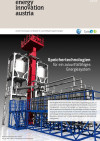Suchergebnisse für "Factsheet%3A Energietechnologien gestalten%2C die f%C3%BCr alle sinnvoll und nutzbar sind"
IEA Bioenergy Task 39: Newsletter, Ausgabe 67, Juni 2025

Der Schwerpunkt dieser Ausgabe liegt auf dem Country Report aus Brasilien „A Biofuels Success Story Brazil“.
Tomas Ekbom, Glaucia Mendes Souza, Jeanette Fogelmark
Herausgeber: IEA Bioenergy TCP Task 39, 2024
Englisch, 23 Seiten
Downloads zur Publikation
Pilotkurs Thermische/r SanierungstechnikerIn im Baugewerbe
September - Dezember 2010
HTL Mödling, Technikerstraße 1-5
2340 Mödling, AT
Der Kurs wird von September bis Dezember 2010 abgehalten. Anmeldungen können ab sofort bis zum 23. August 2010 erfolgen.
IEA EBC Annex 80: Resilient Cooling of Buildings – Policy Recommendations (2024)

Empfehlungen für regulatorische Maßnahmen
Peter Holzer, Institute of Building Research & Innovation, Österreich; Pierre Jaboyedoff, Effin’Art, Schweiz; Emmanuel Bozonnet, La Rochelle Université, Frankreich; Ronnen Levinson, Lawrence Berkeley National Laboratory, USA; Mamak P. Tootkaboni, Politecnico Torino, Italien; Vincenzo Corrado, Politecnico Torino, Italien; Ed Arens, University of California, USA; Haley Gilbert, Affiliate of Lawrence Berkeley National Laboratory; Amanda Krelling, Federal University of Santa Catarina, Brazil; Anaïs Machard, CSTB, Scientific and Technical Center for Buildings, France; Wendy Miller, Queensland University of Technology, Australia; Stephen Selkowitz, Affiliate of Lawrence Berkeley National Laboratory Hui Zhang, Lawrence Berkeley National Laboratory, USA
Herausgeber: IEA EBC Annex 80, 2024
Englisch, 75 Seiten
Downloads zur Publikation
Hinweise für ReferentInnen
IEA Bioenergy Task 39, Newsletter, Ausgabe 64, Dezember 2023

Der Schwerpunkt dieser Ausgabe liegt auf dem Artikel zum Thema „Biofuels production and development in New Zealand“.
Tomas Ekbom, Hannah Edgren
Herausgeber: IEA Bioenergy Task 39, 2023
Englisch, 14 Seiten
Downloads zur Publikation
IEA SHC SOLARUPDATE Vol.68, December 2018

Das SOLARUPDATE ist der Newsletter des IEA SHC Programme.
Herausgeber: IEA Solar Heating & Cooling Programme
Englisch, 21 Seiten
Downloads zur Publikation
Publikationen aus dem IEA Bioenergie Task 42
Im IEA Bioenergie Task 42 wurden ein Newsletter, der Bericht "Bioeconomy Survey 2014" sowie Biorefinery Fact Sheet publiziert.
Speichertechnologien

Speichertechnologien für ein zukunftsfähiges Energiesystem.
energy innovation austria
4/2015
Herausgeber: BMVIT und Klima- und Energiefonds
Deutsch, 8 Seiten
Downloads zur Publikation
Neue Publikationen des IEA AFC Annex 31 "Polymerelektrolytmembran-Brennstoffzellen"
Im IEA AFC Annex 31 wurden drei Papers rund um das Thema "Polymerelektrolytmembran-Brennstoffzellen" publiziert.
IEA SHC Task 68 Webinar/Youtube 2022: Solar goes Digital: Wie Solarwärme selbstlernende Algorithmen nutzt

Präsentation im Rahmen der Webinar-Reihe Austria Solar Webinar 26.
Unterberger Viktor
Herausgeber: BEST
Deutsch
International Symposium: Photovoltaic - Electricity from the Sun: Research - Marketing - Dissemination (Vienna, Austria)
2002-09-13 / 2002-09-14
Vienna, Chamber of Commerce Wiedner Hauptstrasse 63, A-1041 Vienna
Information about the activities in IEA-Photovoltaic Power Systems Program; experiences and status of PV in different countries, marketing, promotion incentives and dissemination strategies for photovoltaics, RTD and training.
EASEYX
Im Rahmen dieses Projektes soll ein Nachhaltigkeits-Index an der Wiener Börse eingeführt werden.
Neue Publikationen des IEA AFC Annex 35 "Brennstoffzellen für portable Anwendungen"
Im IEA AFC Annex 35 wurden fünf Papers rund um das Thema "Brennstoffzellen für portable Anwendungen" publiziert.
Abschließender Besuch der „Haus der Zukunft“-Leitprojekte
Internationale Leitlinie Umweltkostenrechnung

In Zusammenarbeit mit der International Federation of Accountants (IFAC)
Webinar: Innovationen in der Kreislaufwirtschaft
15. Dezember 2022, 11:00 - 12:00 Uhr
Online
Webinar von AEE Intec zur aktuellen Ausgabe der Zeitschrift „nachhaltige technologien“ mit dem Schwerpunktthema „Innovationen in der Kreislaufwirtschaft".
IEA Bioenergy: Biomass Supply and the Sustainable Development Goals – International Case Studies (2021)

37 Best-Practice-Fallstudien aus 18 Ländern wurden von den Mitgliedern des IEA Bioenergy Technology Collaboration Programme ausgewählt, um zu zeigen, wie Biomasse-Lieferketten zur Unterstützung einer nachhaltigen Bioenergieerzeugung eingesetzt werden können, während gleichzeitig ein Beitrag zu den Zielen der Vereinten Nationen für nachhaltige Entwicklung geleistet wird.
Herausgeber: IEA Bioenergy, 2021
Englisch, 94 Seiten
Downloads zur Publikation
Mag. Sabine Mitter
Film "Bauen mit Hausverstand - Das Haus der Zukunft"

Dokumentation über ambitionierte Pilotprojekte vom ersten Spatenstich bis zur Fertigstellung
Mehrsprachig
Fachexkursion Flandern: Programm am 13. September 2018
Tag 3 der Exkursion: Gent - climate active city
